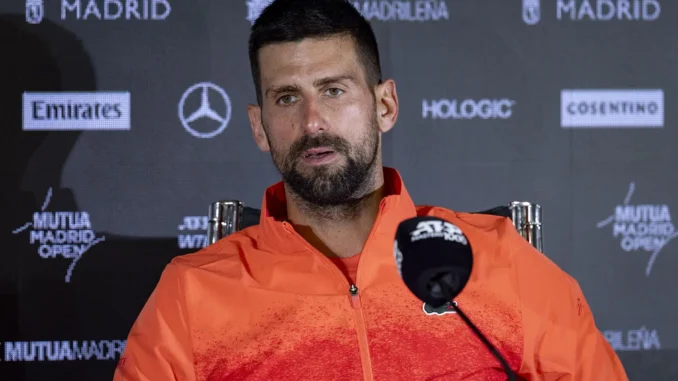
As the clay courts of Roland Garros loom large, Novak Djokovic, the reigning champion and a titan of the sport, has unveiled a significant shift within his coaching team, bringing in familiar faces to navigate the challenges of the upcoming French Open. This announcement comes on the heels of his amicable parting with Andy Murray, a partnership that, while brief, was filled with high expectations.
The Serbian maestro confirmed that Dusan Vemic, a former professional player and a long-time acquaintance, will step into a coaching role. Vemic, 48, is no stranger to Djokovic’s camp, having previously served as an assistant coach and even partnered with him in doubles. This rekindled association signals a return to a trusted dynamic, with Vemic set to work alongside Boris Bosnjakovic, who has been an integral part of Djokovic’s team as an analyst and assistant coach.
Djokovic’s decision to bring Vemic and Bosnjakovic to the forefront, at least for the immediate future, was communicated during his participation in the Geneva Open, a crucial warm-up event before the intensity of Roland Garros. He emphasized that this arrangement is not necessarily a permanent one, stating, “At the moment, I’m not in need of a coach. I don’t need to rush in any context. I feel comfortable with the people around me… in the next few tournaments, and we’ll see what happens.” This measured approach suggests a desire to find the right long-term fit, but also a confidence in the capabilities of his current interim team.
The split with Andy Murray, which concluded after six months, was a mutual decision. While the tennis world buzzed with excitement when the two former rivals joined forces, the on-court results did not consistently materialize as hoped. Djokovic, reflecting on their time together, shared a candid perspective: “We felt like we couldn’t get more out of that partnership on the court, and that’s all there is to it.” Despite the professional separation, Djokovic holds immense respect for Murray, adding, “My respect for Andy remains the same and it’s even greater now that I’ve got to know him better as a person. He has a brilliant tennis IQ, a rare champion’s mindset. He sees the game in an incredible way. But, how can I put it, we didn’t achieve together what we hoped to achieve in terms of results. Sometimes it works, sometimes it doesn’t. We tried.”
Indeed, the recent clay-court season has presented an unusual challenge for Djokovic, marked by early exits in Monte Carlo and Madrid. These uncharacteristic losses have left him searching for his first victory on clay this year, a stark contrast to his usual dominant form. This lack of momentum on his least favored surface, combined with his pursuit of a record-breaking 25th Grand Slam title, underscores the significance of the coaching changes.
Vemic’s history with Djokovic, including being part of the team when Djokovic triumphed at the 2016 Miami Open and their partnership fetching him three majors in an earlier stint from 2011 to 2013, provides a foundation of familiarity and trust. As a former professional player himself, Vemic possesses a deep understanding of the competitive landscape, reaching doubles semifinals at Roland Garros and the Australian Open during his playing career. His expertise, coupled with Bosnjakovic’s analytical insights, could be precisely what Djokovic needs to fine-tune his game and regain his competitive edge.
The upcoming Geneva Open serves as a crucial testing ground for this new coaching dynamic. For Djokovic, it’s an opportunity to build form and confidence before the intense battles that await in Paris. “I’m excited to play a match on clay. I haven’t played many this season. I still haven’t even won one,” Djokovic acknowledged, highlighting the urgency of finding his rhythm. He expressed his hope “to ‘build’ my form before the main objective on this surface that Roland-Garros represents, and to play better than I have in the last month and a half.”
As the tennis world watches, all eyes will be on how this revamped coaching setup impacts Djokovic’s performance. The motivation, he asserts, remains unwavering: “That’s why I’m here, that’s why I’m playing the Geneva tournament, because I’m trying to do well, I’m trying to win more trophies, I’m trying to build my form for Roland Garros, and perform at the desired, necessary level in order to go far in the tournament and challenge the best players in the world. So yes, the motivation is still there.” This new chapter, as Djokovic calls it, is one he is embracing, firm in his belief that he still possesses the game to contend for the sport’s biggest prizes.
Leave a Reply